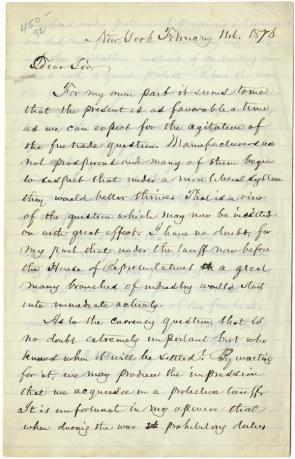William Cullen Bryant opposes the protective tariff, 1876
A Spotlight on a Primary Source by William Cullen Bryant
 During the Civil War, the United States needed to raise funds urgently. It did so by raising the tariff, which taxed goods imported from other countries. In the days before the national income tax, the United States depended on the tariff for most of its revenue. Republicans believed that the tariff protected American manufacturers by taxing imported good and ensuring that American-made products could compete against cheaper, imported goods. Democrats argued that the tariff burdened consumers, particularly farmers and the poor, by keeping prices artificially high.
During the Civil War, the United States needed to raise funds urgently. It did so by raising the tariff, which taxed goods imported from other countries. In the days before the national income tax, the United States depended on the tariff for most of its revenue. Republicans believed that the tariff protected American manufacturers by taxing imported good and ensuring that American-made products could compete against cheaper, imported goods. Democrats argued that the tariff burdened consumers, particularly farmers and the poor, by keeping prices artificially high.
William Cullen Bryant, a poet and editor of the New-York Evening Post, was a lifelong supporter of free trade. In 1808, at the age of fourteen, he had written "Embargo," a poem attacking Thomas Jefferson’s Embargo Act of 1807 and supporting free trade. As this letter from 1876 demonstrates, Bryant remained vehemently in favor of free trade and, ten years after the Civil War, believed that "the present is as favorable a time as we can expect for the agitation of the free trade question":
It is unfortunate in my opinion that when during the war prohibitory duties were laid under pretence of procuring a revenue we did not protest more vehemently and keep up the agitation, instead of contenting our selves with a quiet protest. Before the war the protective system had almost died out – wasting away by a kind of old age. During the war the country went back to state of ignorance and prejudice on the question of free exchange. A new generation had arisen who knew nothing of the subject, and who easily adopted the plausibilities of the protectionists.
Transcript
William Cullen Bryant to Hamilton A. Hill, New York, New York, February 11, 1876
New York February 11th. 1876
Dear Sir,
For my own part it seems to me that the present is as favorable a time as we can expect for the agitation of the free trade question. Manufacturers are not prosperous and many of them begin to suspect that under a more liberal system they would better thrive. That is a view of the question which may now be incited on with great effect. I have no doubt, for my part that under the tariff now before the House of Representatives a great many branches of industry would start into immediate activity.
As to the currency question, that is no doubt extremely important but who knows when it will be settled? By waiting for it, we may produce the impression that we acquiesce in a protective tariff. It is unfortunate in my opinion that when during the war prohibitory duties were laid under pretence of procuring a revenue we did not protest more vehemently and keep up the agitation, instead of contenting our selves with a quiet protest. Before the war the protective system had almost died out – wasting away by a kind of old age. During the war the country went back to state of ignorance and prejudice on the question of free exchange. A new generation had arisen who knew nothing of the subject, and who easily adopted the plausibilities of the protectionists.
It appears to me that at this moment while even the protectionists are bewildered and perplexed at the failure of their thievery the time has arrived for the earnest and unintermitted agitation of the free trade question.
Yours respectfully,
W. C. Bryant
Hamilton A. Hill Esq.
Union Club, 8 Park St.
Boston
